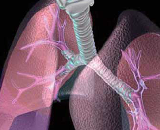Pneumonia
Pneumonitis

Pneumonia is an inflammatory condition of the lung affecting primarily the microscopic air sacs known as alveoli. Typical signs and symptoms include a cough with phlegm, chest pain, fever, and trouble breathing. Pneumonia is usually caused by infection with viruses or bacteria and less commonly by other microorganisms, certain medications and conditions such as autoimmune diseases. Risk factors include other lung diseases such as cystic fibrosis, COPD, and asthma, diabetes, heart failure, a history of smoking, a poor ability to cough such as following a stroke, or a weak immune system. Diagnosis is often based on the symptoms and physical examination. Model for Pneumonia can be used for the research of the physiological process of pneumonia and therapeutic methods.
Organism species: Mus musculus (Mouse)
- Disease model DSI526Mu01 Mouse Model for Pneumonia In Stock
- Disease model DSI526Mu02 Mouse Model for Pneumonia In Stock
- Disease model DSI526Mu03 Mouse Model for Pneumonia In Stock
- Disease model DSI526Mu04 Mouse Model for Pneumonia In Stock
- Disease model DSI526Mu09 Mouse Model for Pneumonia In Stock
- Disease model DSI526Mu05 Mouse Model for Pneumonia In Stock
- Disease model DSI526Mu06 Mouse Model for Pneumonia In Stock
- Disease model DSI526Mu07 Mouse Model for Pneumonia In Stock
- Disease model DSI526Mu08 Mouse Model for Pneumonia In Stock
- Customized Service n/a Tissue of Pneumonia (If Necessary) Tissue Customized Service Offer
- Customized Service n/a Serums of Pneumonia (If Necessary) Serums Customized Service Offer
Organism species: Rattus norvegicus (Rat)
- Disease model DSI526Ra01 Rat Model for Pneumonia In Stock
- Disease model DSI526Ra02 Rat Model for Pneumonia In Stock
- Disease model DSI526Ra03 Rat Model for Pneumonia In Stock
- Disease model DSI526Ra04 Rat Model for Pneumonia In Stock
- Disease model DSI526Ra09 Rat Model for Pneumonia In Stock
- Disease model DSI526Ra05 Rat Model for Pneumonia In Stock
- Disease model DSI526Ra06 Rat Model for Pneumonia In Stock
- Disease model DSI526Ra07 Rat Model for Pneumonia In Stock
- Disease model DSI526Ra08 Rat Model for Pneumonia In Stock
- Customized Service n/a Tissue of Pneumonia (If Necessary) Tissue Customized Service Offer
- Customized Service n/a Serums of Pneumonia (If Necessary) Serums Customized Service Offer
Organism species: Cavia (Guinea pig )
- Disease model DSI526Gu01 Cavia Model for Pneumonia In Stock
- Disease model DSI526Gu02 Cavia Model for Pneumonia In Stock
- Disease model DSI526Gu03 Cavia Model for Pneumonia In Stock
- Disease model DSI526Gu04 Cavia Model for Pneumonia In Stock
- Disease model DSI526Gu09 Cavia Model for Pneumonia In Stock
- Disease model DSI526Gu05 Cavia Model for Pneumonia In Stock
- Disease model DSI526Gu06 Cavia Model for Pneumonia In Stock
- Disease model DSI526Gu07 Cavia Model for Pneumonia In Stock
- Disease model DSI526Gu08 Cavia Model for Pneumonia In Stock
- Customized Service n/a Tissue of Pneumonia (If Necessary) Tissue Customized Service Offer
- Customized Service n/a Serums of Pneumonia (If Necessary) Serums Customized Service Offer
Organism species: Oryctolagus cuniculus (Rabbit)
- Disease model DSI526Rb01 Rabbit Model for Pneumonia In Stock
- Disease model DSI526Rb02 Rabbit Model for Pneumonia In Stock
- Disease model DSI526Rb03 Rabbit Model for Pneumonia In Stock
- Disease model DSI526Rb04 Rabbit Model for Pneumonia In Stock
- Disease model DSI526Rb09 Rabbit Model for Pneumonia In Stock
- Disease model DSI526Rb05 Rabbit Model for Pneumonia In Stock
- Disease model DSI526Rb06 Rabbit Model for Pneumonia In Stock
- Disease model DSI526Rb07 Rabbit Model for Pneumonia In Stock
- Disease model DSI526Rb08 Rabbit Model for Pneumonia In Stock
- Customized Service n/a Tissue of Pneumonia (If Necessary) Tissue Customized Service Offer
- Customized Service n/a Serums of Pneumonia (If Necessary) Serums Customized Service Offer
Organism species: Canis familiaris; Canine (Dog)
- Disease model DSI526Ca01 Canine Model for Pneumonia In Stock
- Disease model DSI526Ca02 Canine Model for Pneumonia In Stock
- Disease model DSI526Ca03 Canine Model for Pneumonia In Stock
- Disease model DSI526Ca04 Canine Model for Pneumonia In Stock
- Disease model DSI526Ca09 Canine Model for Pneumonia In Stock
- Disease model DSI526Ca05 Canine Model for Pneumonia In Stock
- Disease model DSI526Ca06 Canine Model for Pneumonia In Stock
- Disease model DSI526Ca07 Canine Model for Pneumonia In Stock
- Disease model DSI526Ca08 Canine Model for Pneumonia In Stock
- Customized Service n/a Tissue of Pneumonia (If Necessary) Tissue Customized Service Offer
- Customized Service n/a Serums of Pneumonia (If Necessary) Serums Customized Service Offer


